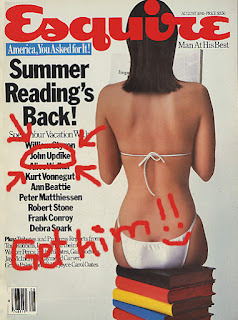
It seems WalMart is fast becoming the final refuge to which the beleaguered audiophile (at least of the
Hornbyan variety) must cling: any other vendor foolish enough to stock and display CDs is too busy filing receivership papers to stay abreast of audiophile tastes.
Which, if WalMart's stock is any indication, are drearily predictable and deeply mired in the past.
Pink Floyd re-re-releases, new (and old)
Alice Cooper,
Bob Seger live . . . flipping through "What's New," the most recent act I'm stumbling across is the late
Amy Winehouse. Hey-hey, my-my: welcome to my record collection!

Some ado is being made of the latest coat of paint to be applied to the Pink Floyd catalog, particularly
Dark Side Of The Moon, which is celebrating
yet another anniversary. DSOTM happens to be one of the first CDs I bought when I set up my original stereo system, and it is an album that's been ripe for the attention of professional knob-fiddlers. Even so, after considering my budget,
Dark Side Of The Moon was not the album I put into my shopping cart:
The Wall was.
There are a couple of reasons for this. I'm a little more sentimental about
The Wall than I am about Pink Floyd's most classic album.
The Wall was the first of Floyd's albums to reach my adolescent ears, so it left the deepest impression. It is huge. It is hugely overindulgent, it is hugely narcissistic, it takes every grievance it has about humanity in a hugely personal way, and no stroke applied in protest of this abysmal condition could possibly be too broad for the work at hand. The Wall best embodies exactly what a Prog Rock Concept Album should be.
I'm also a sucker for reproduced cardboard gatefolds, even if the reduced size has an unfortunate bubblegum card effect on
Gerald Scarfe's nuthouse artwork. But the sonic tweaking more than compensates for this bit of miniaturizing. When I first contrasted the original CDs with the new production on
this collection, it was the selections from
The Wall that stood out. There are all sorts of creepy little noises of things getting squeezed and/or broken that never quite made it through the surface noise of the LP, or even the original digital transfer. I don't expect to be replaying this monstrous behemoth often, but for those occasions when the daily news requires a gloomy, British yawp, I will be reaching for
The Wall.

I recently advised a friend to steer clear of the new
Alice Cooper,
Welcome 2 My Nightmare. He didn't ask for the advice, he didn't need it, and neither (probably) do you. But he was kind enough to solicit further thoughts on the matter. So I described it as, “One of those efforts where the addition of many big names —
Bob Ezrin, Steve Hunter, Dennis Dunaway, Michael Bruce, Neal Smith . . . and
Ke$ha — is a sure sign that nothing is working the way it should.” And I left it at that.
The number in the title indicates this is a follow-up to a well-known and deeply loved “classick” from the 70s —
Welcome To My Nightmare. The trouble, I thought, probably started there. Why revisit an album that diehard fans have committed to memory for the last four decades?
Then again, why not? Vincent Furnier has made it clear he's too canny a showman to treat any of his albums as sacred writ, so why should his fans?

After playing the sequel another time, I retrieved the old album from the back of the closet and fed it into the player. Although it has a couple of songs I frequently put on playlists (“Department of Youth” and “Cold Ethyl”) it's been years since I listened to
Welcome 1 from front to back.
I now realize why:
Welcome 1 isn't much of an album, either. As with most Alice albums, the concept reads as a bit of an afterthought — a sales banner slapped on a collection of backlist retreads. If some fans kvetch about it, as they do on
Amazon, well . . . it's a bit late in the game for that, isn't it? Alice runs a chop-shop. By now there isn't a single song of his which he hasn't ground up countless times and fed through the sausage machine.
So, yes: in 1975 it may have been possible to listen, without rolling one's eyes, to
Vincent Price feasting on the scenery. Children singing like brats in thrall to an evil clown probably set the teeth of Nixon-era parents on edge, too. But 36 years later, even the Steven Suite tries the patience of jaded listeners who like their nightmares to move at a snappier pace.
Which, it must be said,
Welcome 2 certainly does. The ballads have more oomph, the rockers rock, and the one song which does in fact disturb (“When Hell Comes Home”) is a propulsive grinder.
All of which leaves me a little baffled as to why
Welcome 2 doesn't grab me. It's compulsively jokey, but that's usually a good thing, too. In fact the punchline to “I Gotta Get Outta Here,” in which the put-upon doofus who's been singing is set straight on the facts, cracks me up (response: “D'aaaah, ex
cuse me?”). Oddly enough, it evokes for me the singular moment I most enjoy on
Welcome 1: the second bridge in “Cold Ethyl” when Cooper says, “C'mere, Cold Ethyl! What makes you so c-o-o-o-o-o-l-d-d-d?” It's a throw-away line, but he is
so snotty when he says it, it slays me.
Snottiness is the purview of the young, of course, and I am slow to recommend it (listen to any interview with
Johnny Rotten from the last 15 years if you wonder how entertainingly an old-timer wears it). But it is a quality that sends me back to the old albums. I love to hear it.
In fact, I'd love to hear it
better. Say, Coop and Co.: since you've already got my money with the new stuff
and the old stuff, how's about taking a hint from Floyd and
polishing up the classicks? As is, they sound
terrible. Admit it:
you're embarrassed. So why not rectify the situation? You
know I'm not the only easy mark for such a naked cash-grab.

The only
Bob Seger album I ever bought was
Nine Tonight, in 1981. “Old Time Rock & Roll” was hoary even then, but a double album of The Silver Bullet Band's greatest hits struck me as too good a deal to pass up. The album didn't get much play, but I never regretted the purchase. There was too much energy on display for me to get uppity about ten bucks lost.
Thirty years later, there is also a suspiciously
fine quality on display that makes me wonder just how “live” those recordings were. I hardly begrudge a showbiz schmoe like Seger for retreating to the dugout to apply a little studio spit, especially if his LIVE competition at the time included notorious bat-corkers like
Peter Frampton and
KISS. But it is amusing to hear, and still (as
Lester Bangs took pains to point out) delivers more than reasonable value for the frugal listener's hard-earned buck.

I must confess that when she was alive, I lumped
Amy Winehouse in with
Britney Spears as a tabloid performer whose
ouevre would never survive without the broadsheet antics, and left it at that without ever bothering myself to listen to her music. Since her death I've had several friends press me on the matter. Her CDs are now ridiculously cheap, so I finally caved and took them home.
Now I know what everyone else knows: this young woman possessed an astonishing depth of vocal and lyrical talent. Without attempting to tweak the public chorus, I'll just add that I tend to reach for
Frank before I do
Back To Black. The later album skates on a very thin and brittle sheet of self-awareness that is, at times, almost too difficult to listen to in retrospect. Still, she rises above the muck with a performance that conveys genuine good humour even as it acknowledges the inescapable bonds of gravity. It is a shame we've lost her.




































